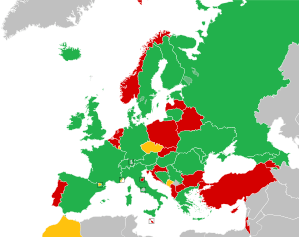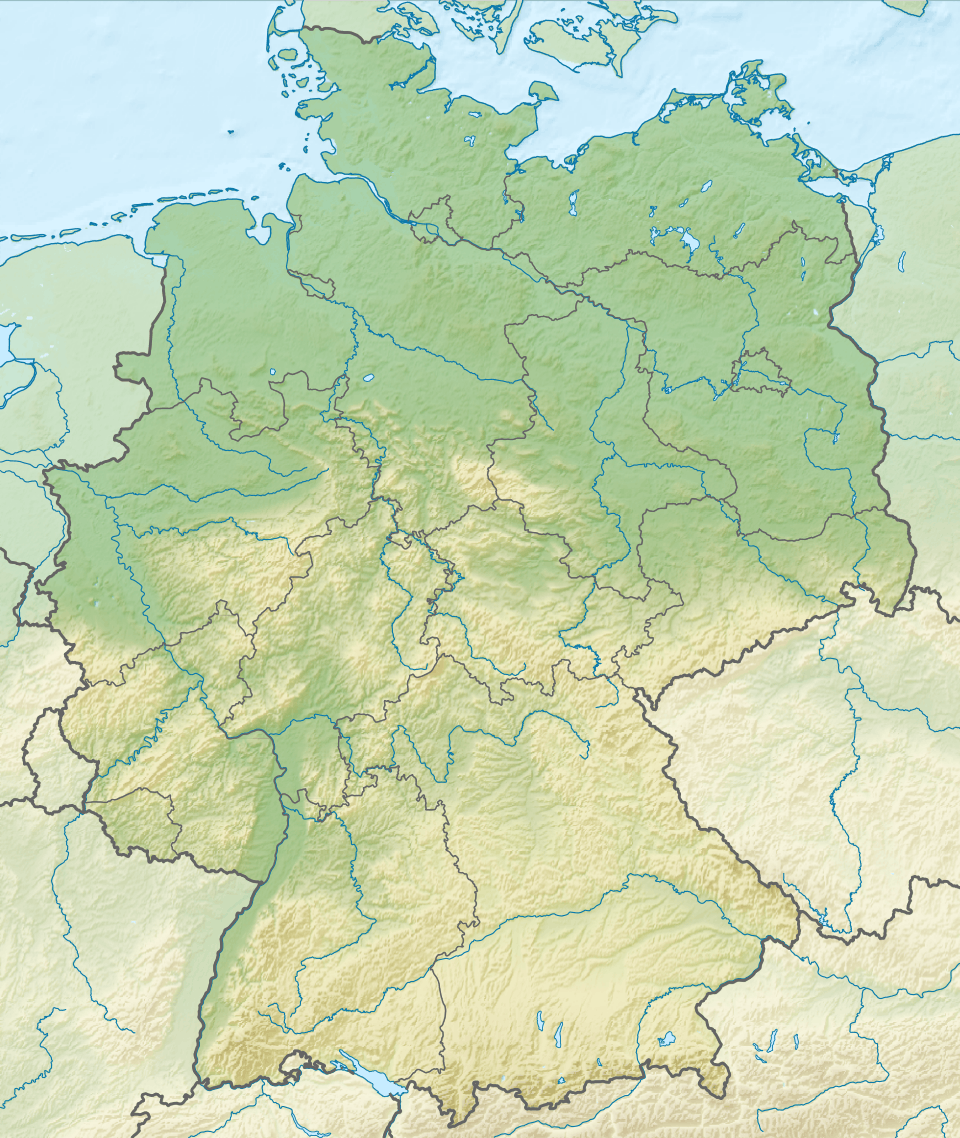Eurovision Song Contest 2011
The Eurovision Song Contest 2011 was the 56th edition of the annual Eurovision Song Contest. It took place in Düsseldorf, Germany, following Lena's win at the 2010 contest in Oslo, Norway with the song "Satellite". It was the third time Germany had hosted the contest (and the first following the German reunification), having previously done so in 1957 and 1983 (both in then West Germany). Organised by the European Broadcasting Union (EBU) and host broadcasters Arbeitsgemeinschaft Rundfunkanstalten Deutschland (ARD) and Norddeutscher Rundfunk (NDR), the contest was held at the Esprit Arena and consisted of two semi-finals on 10 and 12 May, and the final on 14 May 2011.[1] The three live shows were hosted by Anke Engelke, Judith Rakers and Stefan Raab.
| Eurovision Song Contest 2011 | |
|---|---|
| Feel Your Heart Beat! | |
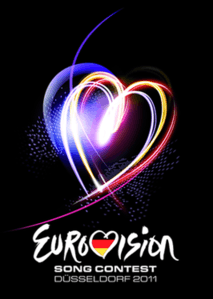 | |
| Dates | |
| Semi-final 1 | 10 May 2011 |
| Semi-final 2 | 12 May 2011 |
| Final | 14 May 2011 |
| Host | |
| Venue | Esprit Arena Düsseldorf, Germany |
| Presenter(s) | |
| Directed by | Ladislaus Kiraly |
| Executive supervisor | Jon Ola Sand |
| Executive producer |
|
| Host broadcaster | |
| Opening act |
|
| Interval act |
|
| Website | eurovision |
| Participants | |
| Number of entries | 43 |
| Debuting countries | None |
| Returning countries | |
| Non-returning countries | None |
Participation map
| |
| Vote | |
| Voting system | Each country awarded 12, 10, 8–1 points to their 10 favourite songs |
| Nul points | None |
| Winning song |
|
Forty-three countries participated in the contest, equalling the record of the 2008 edition. Four countries returned to the contest this year; Austria returned after their last participation in 2007, Hungary returned after their last participation in 2009, San Marino returned after their very first participation in 2008. Italy also returned to the contest after their last participation fourteen years earlier, in 1997.
The winner was Azerbaijan with the song "Running Scared" performed by Ell & Nikki and written by Stefan Örn, Sandra Bjurman and Iain James Farquharson. This was Azerbaijan's first victory in the contest, after only 4 years of participation, and the first victory for one of the South Caucasus countries. It was also the first male-female duo to win the contest since 1963. Italy, Sweden, Ukraine and Denmark rounded out the top five. Apart from Italy, the only other "Big Five" country to make the top 10 were Germany, finishing tenth. However, the United Kingdom followed closely behind, finishing eleventh. This was the first time since the juries were reintroduced alongside the televoting in 2009 that the winner did not place first in the jury voting; Italy was the jury winner, while Azerbaijan was the televote winner.
The broadcast of the final won the Rose d'Or award for Best Live Event.[2]
Location
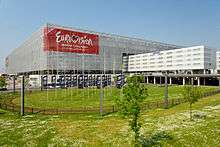
The contest took place in Düsseldorf - the seventh-largest city in Germany. This was the first contest to take place outside the host nation's capital city since the 2004 contest in Istanbul. It was also the first Eurovision Song Contest held in Germany since German reunification, with West Germany having previously hosted the contest in 1957[3] and 1983.[4] Germany was also the first member of the "Big Five" to host the Contest since the implementation of the rule in 2000 that permits the five largest contributors to the EBU – Germany, France, the United Kingdom, Spain and Italy – to qualify automatically for the final alongside the previous year's winner.
The Esprit Arena - a multi-functional football stadium - hosted the contest. The stadium acquired a rental period of six weeks, in order to allow construction and dismantling work in relation to the contest to be carried out.[5] The stadium accommodated a capacity of 38,000 for spectators during the Eurovision Song Contest.[6] Düsseldorf offered 23,000 hotel beds and 2,000 additional beds in the Düsseldorf surroundings and on ships on the River Rhine.[7]
Bidding phase
Twenty-three cities submit official bids to the German broadcaster Norddeutscher Rundfunk (NDR), in order to be the host city for the 2011 contest.[8] Eight of these cities continued to show interest in hosting the event including Berlin, Hamburg, Hanover, Gelsenkirchen,[9] Düsseldorf, Cologne, Frankfurt and Munich.[10] NDR announced on 21 August 2010 that four of those cities had officially applied to host the 2011 Contest: Berlin, Hamburg, Hanover, and Düsseldorf.[11]
- Berlin
Concerns were raised about Berlin's bid concept which consisted of an inflatable tent to be built on Tempelhof's hangar area. Decision makers at NDR reportedly doubted the venue's ability to provide advantageous acoustic conditions. Berlin's speaker Richard Meng neither confirmed nor denied that because, he stated, "secrecy about the bid concepts was promised to the NDR".[12]
- Düsseldorf
On 24 September 2010, it was announced that Fortuna Düsseldorf football club had applied to the Deutsche Fußball Liga for permission to move its home matches to the Paul-Janes-Stadion if the Esprit Arena in Düsseldorf was awarded the 2011 Song Contest. This message indicated that talks with Düsseldorf to host the song contest in the Esprit Arena were already at an advanced stage.[13] The club later announced on 6 October 2010 that it had obtained permission to move its games if necessary.[14]
The Neue Ruhr Zeitung newspaper reported on 12 December 2010 that Fortuna Düsseldorf were to be moved to the Paul-Janes-Stadion due to the contest. Fortuna Düsseldorf's training venue next to the Esprit Arena would be equipped with mobile stands from a Swiss event construction specialist, Nussli Group, creating 20,000 extra seats.[15] This decision was made because the Arena Sportpark Düsseldorf holds better logistic qualifications.
- Hamburg
On 2 October 2010 the Hamburger Abendblatt newspaper announced that Hamburg would be unable to host the 2011 Song Contest, because the city could no longer fulfil the required financial conditions.[16]
Host selection
On 12 October 2010, the German broadcaster Norddeutscher Rundfunk (NDR) announced, that the Esprit Arena in Düsseldorf had been chosen as the host venue for the 2011 Eurovision Song Contest.[17][18]
Key
![]()
| City | Venue | Notes |
|---|---|---|
| Berlin | A large tent on the grounds of Tempelhof Airport | If chosen, the tent would have been located on the field near the hangars. Allegedly only room for 9,000 spectators.[19] |
| Düsseldorf | Esprit Arena |
Home of the Fortuna Düsseldorf football club. The stadium can hold up to 50,000 spectators, but will hold up to 38,000 spectators for the contest.[19][20] |
| Hamburg | Hamburg Messehallen, Hall A1[19] | Would be staged at Hall A1, but with room for less than 10,000 spectators. |
| Hanover | Hanover Exhibition Centre (Messe) | — |
Format
The four countries that were part of the Big Four, along with the host of the contest, automatically qualify for a place in the final. Since Germany was both a "Big Four" country and the host for the 2011 contest, there was a vacant spot in the final. At a Reference Group meeting in Belgrade it was decided that the existing rules would remain in place, and that the number of participants in the final would simply be lowered from twenty-five to twenty-four.[21] On 31 December 2010, the official participation list was published by the EBU, which stipulated that with the return of Italy to the contest, this nation would become a member of the "Big Five". This change permitted Italy automatic qualification into the finals, alongside France, Spain, the United Kingdom, and host nation Germany, restoring the number of participants for the final to twenty-five nations.[22]
On 30 August 2010 it was announced that Svante Stockselius, Executive Supervisor of the Eurovision Song Contest, would be leaving his position on 31 December 2010.[23] On 26 November 2010, EBU reported that Jon Ola Sand would be the new Executive Supervisor of the Eurovision Song Contest.[24]
Semi-final allocation draw
The draw to determine the semi-final running orders was held on 17 January 2011. All of the participating countries excluding the automatic finalists were split into six pots, based on the voting history of those countries in previous years. From these pots, half (or as close to half as was possible) competed in the first semi-final on 10 May 2011. The other half in that particular pot competed in the second semi-final on 12 May 2011. This draw doubled as an approximate running order, in order for the delegations from the countries to know when their rehearsals commenced. The draw also determined in which of the semi-finals the automatic finalists would be able to cast their votes.[25]
Israeli broadcaster IBA requested to compete in the second semi-final, rather than the first semi-final that was pulled in the draw, due to Israel's Memorial Day coinciding with the first semi-final. German broadcaster NDR also requested that it be allowed to vote in the second semi-final for scheduling reasons.[25]
| Pot 1 | Pot 2 | Pot 3 | Pot 4 | Pot 5 | Pot 6 |
|---|---|---|---|---|---|
Graphic design
.jpg)
The design of the contest was built around the motto "Feel your heart beat", with the logo and on-screen graphics designed by Turquoise Branding.[26] The postcard introducing each performance included the logo in the colours of the performing country (e.g. the United Kingdom in red, white and blue); then a German place was shown in a toy-like view using tilt-shift photography and a story happened there, whose main characters were people either living in Germany or tourists from that country. The contest's motto, 'Feel your heart beat', was then shown or said in the country's national or native language.[27] For example, in the first postcard shown (Poland's), the boyfriend drops a piece of paper. The camera then pans down to the paper, to show the Polish phrase "Poczuj bicie serca" handwritten on it. In the second postcard shown (Norway's), a mountain climber from Norway climbs to the top of a mountain and yells the Norwegian phrase "Kjenn ditt hjerte slå.". Then, the heart appeared once again, and the stage and the crowd could be seen, with heartbeat sounds and pink lights pulsating in rhythm with the heartbeat, before the performance started.
The main colours of the letterboxes were black and pink. The scoreboard showed a spokesperson from the country giving their votes on the right, while showing a table of results on the left. The large points (8, 10 and 12) were highlighted in pink, whilst the lower points, (1–7) were in purple.[28] This scoreboard design was used again the following year, with minor changes such as the large points appearing progressively larger in size compared to the lower points and the highlighted colours changed to match the 2012 theme, "Light your fire!"[29]
National host broadcaster
%2C_Judith_Rakers_(2009)_and_Stefan_Raab_(2010).jpg)
ARD, the European Broadcasting Union member to broadcast the Eurovision Song Contest in Germany, is a joint organisation of Germany's regional public-service broadcasters. The ARD has 10 members. The venues that were in consideration are located in the areas of three different members: Berlin is located within the Rundfunk Berlin-Brandenburg (RBB) member area, Hamburg and Hanover within the Norddeutscher Rundfunk (NDR) area and Düsseldorf within the Westdeutscher Rundfunk (WDR) broadcasting area. While NDR has been responsible for the transmission of the Eurovision Song Contest in recent years when the final took place in other countries, the financial scope of the three broadcasters seemed to have become a decisive factor in the application procedure for the 2011 Eurovision Song Contest. The Tagesspiegel reported on 7 October 2010 that the costs for hosting this event resulted in a tense discussion about necessary savings on other programme contents made by the three broadcasters.
Hosts
On 16 December 2010, NDR announced that Anke Engelke, Judith Rakers, and Stefan Raab were to be the presenters for the contest. It was the third time three people would host the contest, the previous such contests being 1999 and 2010.[30] Raab is known as the German representative in 2000 with "Wadde hadde dudde da?", whereas Engelke is an actress and comedian, and Rakers journalist and television presenter.
Event concept and ticket sale
On 13 October 2010 Thomas Schreiber, coordinator at ARD, outlined details of Düsseldorf's event concept. The Esprit Arena was to be split in two parts separated from each other. On one side of the stadium the stage would be installed while the other side would function as background dressing rooms for the artist delegations. An athletics arena next to the Esprit Arena would serve as the press centre for the event. The Esprit Arena offered comfortable seats relatively near to the stage that created an indoor event arena atmosphere rather than a football-stadium ambiance. There were plans to allow the public the chance to attend the dress rehearsals.[31] Altogether, tickets were sold for seven shows (the final, two semi-finals and four dress rehearsals).[32]
He also said in that interview that tickets for the event were likely to go on sale "within the next four weeks" (by mid-November 2010). NDR had already opened a preregistration e-mail-newsletter on its website for all people interested in tickets for the event.[33]
Ticket sales started on 12 December 2010 at 12:12 CET on the website www.dticket.de, the only authorised seller.[34] However, the ticket page opened for sales approximately two hours earlier than originally advertised; this announcement was made by an email newsletter sent to preregistered buyers minutes before opening, giving them a slight benefit in acquiring tickets. The final 32,000 tickets that were put on sale on 12 December sold out in less than six hours. Once camera positions had been determined, a few thousand extra tickets were put on sale.
Tickets for the semi-finals were put on sale in mid-January, when it was known which countries would take part in each semi-final.[35]
Participating countries
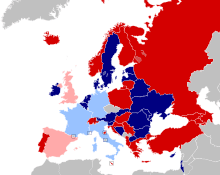
On 31 December 2010, the EBU confirmed that 43 countries would compete in the 2011 Contest.[36][22] The 2011 edition saw the returns of Austria, which had last participated in 2007; Italy, which had last participated in 1997; San Marino, which had only taken part in 2008; and Hungary, which had last participated in 2009.[22] Montenegro had applied to take part in the contest on 4 December, but decided against participation and withdrew on 23 December, two days before 25 December no-strings-attached deadline.[37]
Slovakia announced its withdrawal from the 2011 Contest due to financial reasons, despite holding a public poll on the Slovenská televízia (STV) website on its Eurovision participation which received an 87.5% positive vote. STV announced that it planned to return in the 2012 contest.[38][39] However, Slovakia's application remained on the provisional list, leading to Slovakia's continued participation in the 2011 contest.[22] STV announced in January 2011 that Slovakia would yet withdraw from the contest, citing to financial reasons and organisational changes.[40] However the country was listed by the EBU as one of the semi-finalist countries in the semi-final allocation draw on 17 January, and STV later confirmed they would continue their participation to avoid a fine for a late withdrawal.[25][41]
At a meeting in Belgrade on 28 August 2010, the EBU decided that each country had to choose its artist and song before 14 March 2011. On 15 March 2011, the draw for the running order took place in the host city.[42] The semi-final allocation draw took place on 17 January in Düsseldorf.[22]
Returning artists
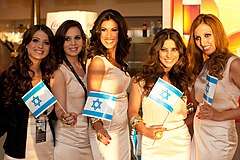
Several artists made their return to the Eurovision Song Contest, including Dino Merlin,[43] who had represented Bosnia and Herzegovina in 1999. Gunnar Ólason (part of Sjonni's Friends)[44] for Iceland had last appeared in 2001 as part of Two Tricky.[45] Moldova's 2005 entrant Zdob și Zdub also returned.[46] TWiiNS from Slovakia also return, they were backing vocalists for the Czech Republic in 2008.[47] Sophio Toroshelidze, the lead singer of Eldrine from Georgia, was a lead singer for Sofia Nizharadze, Georgia's entry in 2010.[48]
Along with those artists, two previous Eurovision winners also returned to the contest: Dana International who won for Israel in 1998, and Lena[1] who won for Germany in 2010 and brought the contest to Düsseldorf. Stefan Raab, who represented Germany in 2000 and appeared as a conductor and backing artist for other German entries, hosted the contest. This was the first time since 1958 and only the second time in the history of the contest that two former winners returned on the same year.
Semi-final 1
The full split jury/televoting results were announced by the EBU in May 2011.[49]
- The first semi-final took place in Esprit Arena in Düsseldorf on 10 May 2011.
- The ten countries in this semi-final with the highest scoring points, according to a combination of televotes and jury votes from each voting country, qualified for the final.[50]
- Spain and the United Kingdom voted in this semi-final.
| Draw | Country[22] | Artist[51] | Song[51] | Language[52] | Place[53] | Points[53] |
|---|---|---|---|---|---|---|
| 01 | Magdalena Tul | "Jestem" | Polish | 19 | 18 | |
| 02 | Stella Mwangi | "Haba Haba" | English, Swahili | 17 | 30 | |
| 03 | Aurela Gaçe | "Feel the Passion" | English[lower-alpha 1] | 14 | 47 | |
| 04 | Emmy | "Boom Boom" | English | 12 | 54 | |
| 05 | Yüksek Sadakat | "Live It Up" | English | 13 | 47 | |
| 06 | Nina | "Čaroban" (Чаробан) | Serbian | 8 | 67 | |
| 07 | Alexey Vorobyov | "Get You" | English, Russian | 9 | 64 | |
| 08 | Anna Rossinelli | "In Love for a While" | English | 10 | 55 | |
| 09 | Eldrine | "One More Day" | English | 6 | 74 | |
| 10 | Paradise Oskar | "Da Da Dam" | English | 3 | 103 | |
| 11 | Glen Vella | "One Life" | English | 11 | 54 | |
| 12 | Senit | "Stand By" | English | 16 | 34 | |
| 13 | Daria | "Celebrate" | English | 15 | 41 | |
| 14 | Sjonni's Friends | "Coming Home" | English | 4 | 100 | |
| 15 | Kati Wolf | "What About My Dreams?" | English, Hungarian | 7 | 72 | |
| 16 | Homens da Luta | "A luta é alegria" | Portuguese | 18 | 22 | |
| 17 | Evelina Sašenko | "C'est ma vie" | English[lower-alpha 2] | 5 | 81 | |
| 18 | Ell & Nikki | "Running Scared" | English | 2 | 122 | |
| 19 | Loukas Giorkas feat. Stereo Mike | "Watch My Dance" | English, Greek | 1 | 133 |
Semi-final 2
The full split jury/televoting results were announced by the EBU in May 2011.[49]
- The second semi-final took place in Esprit Arena in Düsseldorf on 12 May 2011.
- The ten countries in this semi-final with the highest scoring points, according to a combination of televotes and jury votes from each voting country, qualified for the final.[50]
- France, Germany and Italy voted in this semi-final.
Final
- The final took place on 14 May 2011.
- Only the "Big Five" countries automatically qualified for the final.
- From the two semi-finals on 10 and 12 May 2011, twenty countries qualified for the final. A total of twenty-five countries competed in the final.[42]
- The voting system used was the same as in the 2010 contest, with a combination of televotes and jury votes selecting the winner. Viewers were able to vote during the performances; the voting window ended 15 minutes after the conclusion of the songs.[50]
- Background music for the show included "Wonderful" by Gary Go.
Scoreboard
The split jury/televoting results were announced by the EBU in May 2011. As in 2010, only the split totals received by each country were given, not the full breakdown,[49] although the BBC revealed the details of the United Kingdom vote on 26 May 2011.[57]
Semi-final 1
| Semi-final 1 | ||||||
|---|---|---|---|---|---|---|
| Place | Televoting | Points | Jury | Points | ||
| 1 | 154 | 113 | ||||
| 2 | 124 | 109 | ||||
| 3 | 111 | 104 | ||||
| 4 | 93 | 102 | ||||
| 5 | 90 | 86 | ||||
| 6 | 79 | 84 | ||||
| 7 | 75 | 76 | ||||
| 8 | 73 | 74 | ||||
| 9 | 56 | 74 | ||||
| 10 | 54 | 65 | ||||
| 11 | 52 | 61 | ||||
| 12 | 45 | 58 | ||||
| 13 | 42 | 51 | ||||
| 14 | 42 | 49 | ||||
| 15 | 39 | 33 | ||||
| 16 | 32 | 31 | ||||
| 17 | 25 | 29 | ||||
| 18 | 24 | 13 | ||||
| 19 | 8 | 6 | ||||
| Voting results | |||||||||||||||||||||||
|---|---|---|---|---|---|---|---|---|---|---|---|---|---|---|---|---|---|---|---|---|---|---|---|
| Poland | 18 | 3 | 4 | 4 | 2 | 5 | |||||||||||||||||
| Norway | 30 | 1 | 1 | 1 | 2 | 8 | 4 | 10 | 2 | 1 | |||||||||||||
| Albania | 47 | 8 | 6 | 8 | 7 | 4 | 2 | 12 | |||||||||||||||
| Armenia | 54 | 2 | 7 | 8 | 8 | 7 | 7 | 4 | 8 | 3 | |||||||||||||
| Turkey | 47 | 12 | 2 | 5 | 3 | 2 | 10 | 12 | 1 | ||||||||||||||
| Serbia | 67 | 6 | 7 | 2 | 4 | 12 | 7 | 3 | 3 | 12 | 5 | 1 | 3 | 2 | |||||||||
| Russia | 64 | 4 | 3 | 12 | 3 | 6 | 5 | 3 | 1 | 5 | 3 | 3 | 3 | 5 | 5 | 3 | |||||||
| Switzerland | 55 | 3 | 6 | 3 | 2 | 6 | 2 | 6 | 8 | 5 | 6 | 6 | 2 | ||||||||||
| Georgia | 74 | 5 | 8 | 10 | 4 | 5 | 1 | 8 | 2 | 1 | 12 | 8 | 10 | ||||||||||
| Finland | 103 | 10 | 12 | 6 | 1 | 3 | 12 | 10 | 3 | 12 | 6 | 8 | 7 | 3 | 4 | 6 | |||||||
| Malta | 54 | 2 | 6 | 7 | 2 | 5 | 6 | 12 | 4 | 2 | 1 | 7 | |||||||||||
| San Marino | 34 | 8 | 5 | 5 | 1 | 6 | 1 | 6 | 2 | ||||||||||||||
| Croatia | 41 | 7 | 12 | 1 | 12 | 4 | 1 | 4 | |||||||||||||||
| Iceland | 100 | 4 | 10 | 2 | 8 | 3 | 8 | 10 | 12 | 10 | 8 | 6 | 12 | 7 | |||||||||
| Hungary | 72 | 5 | 6 | 10 | 12 | 1 | 6 | 7 | 5 | 10 | 10 | ||||||||||||
| Portugal | 22 | 4 | 4 | 2 | 1 | 8 | 3 | ||||||||||||||||
| Lithuania | 81 | 12 | 8 | 4 | 1 | 7 | 3 | 10 | 2 | 2 | 5 | 6 | 4 | 5 | 12 | ||||||||
| Azerbaijan | 122 | 8 | 5 | 12 | 10 | 1 | 12 | 5 | 10 | 5 | 10 | 8 | 7 | 7 | 10 | 7 | 1 | 4 | |||||
| Greece | 133 | 7 | 1 | 10 | 10 | 4 | 7 | 6 | 7 | 7 | 4 | 5 | 6 | 8 | 10 | 12 | 4 | 10 | 7 | 8 | |||
12 points
Below is a summary of the maximum 12 points each country awarded to another in the first semi-final:
| N. | Contestant | Nation(s) giving 12 points |
|---|---|---|
| 3 | Finland | Iceland, Norway, Russia |
| 2 | Azerbaijan | Georgia, Turkey |
| Croatia | Malta, Serbia | |
| Iceland | Hungary, Spain | |
| Lithuania | Poland, United Kingdom | |
| Serbia | Croatia, Switzerland | |
| Turkey | Albania, Azerbaijan | |
| 1 | Albania | Greece |
| Georgia | Lithuania | |
| Greece | Portugal | |
| Hungary | Finland | |
| Malta | San Marino | |
| Russia | Armenia |
Semi-final 2
| Semi-final 2 | ||||||
|---|---|---|---|---|---|---|
| Place | Televoting | Points | Jury | Points | ||
| 1 | 159 | 146 | ||||
| 2 | 131 | 129 | ||||
| 3 | 121 | 99 | ||||
| 4 | 115 | 95 | ||||
| 5 | 91 | 85 | ||||
| 6 | 78 | 83 | ||||
| 7 | 68 | 76 | ||||
| 8 | 61 | 71 | ||||
| 9 | 54 | 71 | ||||
| 10 | 52 | 66 | ||||
| 11 | 51 | 65 | ||||
| 12 | 50 | 59 | ||||
| 13 | 46 | 53 | ||||
| 14 | 43 | 47 | ||||
| 15 | 43 | 38 | ||||
| 16 | 40 | 36 | ||||
| 17 | 33 | 24 | ||||
| 18 | 23 | 22 | ||||
| 19 | 17 | 11 | ||||
| Voting results | ||||||||||||||||||||||||
|---|---|---|---|---|---|---|---|---|---|---|---|---|---|---|---|---|---|---|---|---|---|---|---|---|
| Bosnia and Herzegovina | 109 | 12 | 10 | 4 | 12 | 4 | 8 | 12 | 12 | 5 | 2 | 7 | 10 | 7 | 4 | |||||||||
| Austria | 69 | 7 | 3 | 5 | 1 | 4 | 4 | 10 | 1 | 7 | 2 | 5 | 2 | 1 | 12 | 5 | ||||||||
| Netherlands | 13 | 8 | 5 | |||||||||||||||||||||
| Belgium | 53 | 8 | 1 | 6 | 6 | 2 | 6 | 2 | 2 | 8 | 1 | 3 | 6 | 2 | ||||||||||
| Slovakia | 48 | 6 | 3 | 3 | 12 | 7 | 3 | 3 | 3 | 3 | 5 | |||||||||||||
| Ukraine | 81 | 4 | 10 | 8 | 3 | 5 | 3 | 6 | 8 | 6 | 2 | 7 | 12 | 1 | 6 | |||||||||
| Moldova | 54 | 4 | 2 | 5 | 4 | 12 | 10 | 1 | 4 | 5 | 7 | |||||||||||||
| Sweden | 155 | 5 | 10 | 12 | 12 | 7 | 5 | 3 | 12 | 2 | 12 | 5 | 7 | 12 | 8 | 7 | 12 | 8 | 12 | 1 | 3 | |||
| Cyprus | 16 | 6 | 2 | 8 | ||||||||||||||||||||
| Bulgaria | 48 | 2 | 2 | 1 | 5 | 1 | 10 | 1 | 4 | 4 | 1 | 3 | 4 | 10 | ||||||||||
| Macedonia | 36 | 10 | 7 | 1 | 3 | 8 | 7 | |||||||||||||||||
| Israel | 38 | 5 | 2 | 5 | 1 | 7 | 4 | 6 | 7 | 1 | ||||||||||||||
| Slovenia | 112 | 12 | 8 | 8 | 8 | 4 | 7 | 8 | 10 | 6 | 10 | 5 | 4 | 8 | 6 | 5 | 3 | |||||||
| Romania | 111 | 6 | 4 | 10 | 6 | 12 | 7 | 8 | 1 | 4 | 7 | 6 | 5 | 6 | 3 | 8 | 6 | 12 | ||||||
| Estonia | 60 | 5 | 6 | 8 | 6 | 4 | 5 | 1 | 8 | 3 | 10 | 4 | ||||||||||||
| Belarus | 45 | 2 | 1 | 10 | 10 | 3 | 8 | 1 | 4 | 6 | ||||||||||||||
| Latvia | 25 | 4 | 2 | 8 | 2 | 2 | 7 | |||||||||||||||||
| Denmark | 135 | 1 | 7 | 7 | 7 | 3 | 3 | 2 | 12 | 6 | 12 | 10 | 10 | 5 | 10 | 4 | 12 | 12 | 2 | 10 | ||||
| Ireland | 68 | 3 | 1 | 5 | 2 | 2 | 10 | 7 | 1 | 6 | 3 | 10 | 10 | 8 | ||||||||||
12 points
Below is a summary of the maximum 12 points each country awarded to another in the second semi-final:
| N. | Contestant | Nation(s) giving 12 points |
|---|---|---|
| 7 | Sweden | Belgium, Cyprus, Denmark, Estonia, France, Israel, Netherlands |
| 4 | Bosnia and Herzegovina | Austria, Macedonia, Slovakia, Slovenia |
| Denmark | Bulgaria, Ireland, Latvia, Sweden | |
| 2 | Romania | Italy, Moldova |
| 1 | Austria | Germany |
| Moldova | Romania | |
| Slovakia | Ukraine | |
| Slovenia | Bosnia and Herzegovina | |
| Ukraine | Belarus |
Final
| Final | ||||||
|---|---|---|---|---|---|---|
| Place | Televoting | Points | Jury | Points | ||
| 1 | 223 | 251 | ||||
| 2 | 221 | 182 | ||||
| 3 | 176 | 168 | ||||
| 4 | 168 | 160 | ||||
| 5 | 166 | 145 | ||||
| 6 | 151 | 119 | ||||
| 7 | 138 | 117 | ||||
| 8 | 138 | 111 | ||||
| 9 | 113 | 106 | ||||
| 10 | 101 | 104 | ||||
| 11 | 99 | 90 | ||||
| 12 | 98 | 90 | ||||
| 13 | 89 | 86 | ||||
| 14 | 79 | 84 | ||||
| 15 | 76 | 82 | ||||
| 16 | 73 | 79 | ||||
| 17 | 64 | 75 | ||||
| 18 | 61 | 74 | ||||
| 19 | 60 | 72 | ||||
| 20 | 55 | 66 | ||||
| 21 | 47 | 60 | ||||
| 22 | 39 | 57 | ||||
| 23 | 32 | 53 | ||||
| 24 | 25 | 38 | ||||
| 25 | 2 | 25 | ||||
| Voting results[58] | |||||||||||||||||||||||||||||||||||||||||||||
|---|---|---|---|---|---|---|---|---|---|---|---|---|---|---|---|---|---|---|---|---|---|---|---|---|---|---|---|---|---|---|---|---|---|---|---|---|---|---|---|---|---|---|---|---|---|
| Finland | 57 | 12 | 10 | 5 | 5 | 7 | 2 | 5 | 1 | 3 | 7 | ||||||||||||||||||||||||||||||||||
| Bosnia and Herzegovina | 125 | 2 | 8 | 4 | 4 | 12 | 12 | 8 | 7 | 12 | 10 | 12 | 3 | 5 | 12 | 7 | 7 | ||||||||||||||||||||||||||||
| Denmark | 134 | 7 | 12 | 3 | 7 | 12 | 6 | 5 | 3 | 10 | 4 | 6 | 8 | 7 | 1 | 5 | 12 | 10 | 10 | 6 | |||||||||||||||||||||||||
| Lithuania | 63 | 2 | 3 | 6 | 12 | 12 | 7 | 2 | 1 | 10 | 1 | 7 | |||||||||||||||||||||||||||||||||
| Hungary | 53 | 4 | 12 | 5 | 2 | 5 | 2 | 2 | 8 | 7 | 6 | ||||||||||||||||||||||||||||||||||
| Ireland | 119 | 3 | 5 | 10 | 4 | 8 | 12 | 12 | 4 | 1 | 12 | 8 | 8 | 6 | 2 | 7 | 7 | 10 | |||||||||||||||||||||||||||
| Sweden | 185 | 1 | 10 | 10 | 1 | 6 | 10 | 4 | 6 | 7 | 10 | 3 | 10 | 6 | 3 | 4 | 4 | 6 | 1 | 10 | 1 | 4 | 4 | 3 | 6 | 10 | 5 | 4 | 5 | 12 | 12 | 3 | 4 | ||||||||||||
| Estonia | 44 | 2 | 7 | 2 | 2 | 7 | 7 | 5 | 6 | 2 | 4 | ||||||||||||||||||||||||||||||||||
| Greece | 120 | 8 | 10 | 2 | 12 | 6 | 7 | 3 | 8 | 10 | 8 | 2 | 6 | 3 | 8 | 10 | 8 | 1 | 8 | ||||||||||||||||||||||||||
| Russia | 77 | 4 | 2 | 8 | 8 | 1 | 5 | 4 | 1 | 4 | 4 | 5 | 4 | 3 | 6 | 8 | 5 | 5 | |||||||||||||||||||||||||||
| France | 82 | 3 | 1 | 7 | 5 | 4 | 5 | 3 | 12 | 2 | 6 | 2 | 1 | 2 | 4 | 10 | 2 | 12 | 1 | ||||||||||||||||||||||||||
| Italy | 189 | 1 | 3 | 6 | 1 | 3 | 7 | 6 | 10 | 12 | 3 | 1 | 3 | 4 | 10 | 7 | 8 | 2 | 3 | 6 | 12 | 10 | 10 | 4 | 10 | 6 | 5 | 12 | 6 | 6 | 12 | ||||||||||||||
| Switzerland | 19 | 4 | 10 | 5 | |||||||||||||||||||||||||||||||||||||||||
| United Kingdom | 100 | 4 | 12 | 10 | 4 | 3 | 1 | 2 | 5 | 2 | 3 | 2 | 5 | 1 | 6 | 2 | 1 | 2 | 6 | 7 | 3 | 3 | 6 | 1 | 4 | 5 | |||||||||||||||||||
| Moldova | 97 | 7 | 8 | 7 | 5 | 8 | 5 | 4 | 7 | 5 | 4 | 7 | 12 | 5 | 4 | 8 | 1 | ||||||||||||||||||||||||||||
| Germany | 107 | 7 | 6 | 5 | 6 | 8 | 10 | 4 | 6 | 7 | 3 | 8 | 4 | 3 | 1 | 8 | 2 | 3 | 3 | 5 | 8 | ||||||||||||||||||||||||
| Romania | 77 | 6 | 4 | 12 | 4 | 1 | 6 | 5 | 1 | 1 | 8 | 6 | 1 | 12 | 10 | ||||||||||||||||||||||||||||||
| Austria | 64 | 5 | 1 | 1 | 3 | 2 | 3 | 2 | 1 | 4 | 12 | 5 | 1 | 7 | 3 | 3 | 2 | 2 | 7 | ||||||||||||||||||||||||||
| Azerbaijan | 221 | 12 | 6 | 8 | 10 | 5 | 8 | 7 | 8 | 8 | 3 | 10 | 12 | 1 | 5 | 8 | 6 | 10 | 6 | 10 | 8 | 12 | 8 | 7 | 8 | 8 | 4 | 8 | 10 | 3 | 2 | ||||||||||||||
| Slovenia | 96 | 5 | 2 | 6 | 10 | 1 | 7 | 3 | 1 | 1 | 2 | 10 | 12 | 4 | 3 | 1 | 6 | 12 | 2 | 3 | 2 | 3 | |||||||||||||||||||||||
| Iceland | 61 | 5 | 8 | 8 | 4 | 6 | 1 | 10 | 4 | 12 | 1 | 2 | |||||||||||||||||||||||||||||||||
| Spain | 50 | 4 | 2 | 1 | 2 | 3 | 12 | 5 | 5 | 12 | 4 | ||||||||||||||||||||||||||||||||||
| Ukraine | 159 | 10 | 8 | 7 | 5 | 12 | 7 | 12 | 2 | 2 | 12 | 6 | 7 | 7 | 10 | 6 | 5 | 10 | 2 | 3 | 4 | 7 | 7 | 8 | |||||||||||||||||||||
| Serbia | 85 | 3 | 3 | 2 | 6 | 1 | 8 | 7 | 6 | 5 | 10 | 6 | 8 | 1 | 5 | 10 | 4 | ||||||||||||||||||||||||||||
| Georgia | 110 | 6 | 1 | 12 | 10 | 7 | 7 | 10 | 8 | 8 | 12 | 5 | 12 | 2 | 3 | 7 | |||||||||||||||||||||||||||||
| Vertically, the table is ordered by appearance in the final. Horizontally, the table is ordered by voting order. | |||||||||||||||||||||||||||||||||||||||||||||
12 points
Below is a summary of the maximum 12 points each country awarded to another in the final:
| N. | Contestant | Nation(s) giving 12 points |
|---|---|---|
| 5 | Bosnia and Herzegovina | Austria, Macedonia, Serbia, Slovenia, Switzerland |
| 4 | Italy | Albania, Latvia, San Marino, Spain |
| 3 | Azerbaijan | Malta, Russia, Turkey |
| Denmark | Iceland, Ireland, Netherlands | |
| Georgia | Belarus, Lithuania, Ukraine | |
| Ireland | Denmark, Sweden, United Kingdom | |
| Ukraine | Armenia, Azerbaijan, Slovakia | |
| 2 | France | Belgium, Greece |
| Lithuania | Georgia, Poland | |
| Romania | Italy, Moldova | |
| Slovenia | Bosnia and Herzegovina, Croatia | |
| Spain | France, Portugal | |
| Sweden | Estonia, Israel | |
| 1 | Austria | Germany |
| Finland | Norway | |
| Greece | Cyprus | |
| Hungary | Finland | |
| Iceland | Hungary | |
| Moldova | Romania | |
| United Kingdom | Bulgaria |
A record number of 20 countries received at least one set of 12 points during the final. The only five countries not to receive full marks were Estonia, Russia, Switzerland, Germany and Serbia. Estonia was the only country without any 8, 10 or 12 point scores, and thus its name was never said out loud during the voting.
Other awards
Marcel Bezençon Awards
The Marcel Bezençon Awards were first handed out during the Eurovision Song Contest 2002 in Tallinn, Estonia honouring the best competing songs in the final. Founded by Christer Björkman (Sweden's representative in the 1992 Eurovision Song Contest and current Head of Delegation for Sweden) and Richard Herrey (member of the Herreys, Eurovision Song Contest 1984 winner from Sweden), the awards are named after the creator of the annual competition, Marcel Bezençon.[59] The awards are divided into three categories: Press Award; Artistic Award; and Composer Award.[60]
| Category | Country | Song | Performer(s) | Composer(s) |
|---|---|---|---|---|
| Artists Award | "Lipstick" | Jedward | Dan Priddy, Lars Halvor Jensen, Martin M. Larsson | |
| Composer Award | "Sognu" | Amaury Vassili | Daniel Moyne, Quentin Bachelet, Jean-Pierre Marcellesi, and Julie Miller | |
| Press Award | "Da Da Dam" | Paradise Oskar | Axel Ehnström |
OGAE
Organisation Générale des Amateurs de l'Eurovision (more commonly known as OGAE) is an international organisation that was founded in 1984 in Savonlinna, Finland by Jari-Pekka Koikkalainen.[61] The organisation consists of a network of 40 Eurovision Song Contest fan clubs across Europe and beyond, and is a non-governmental, non-political, and non-profitable company.[62] In what has become an annual tradition for the OGAE fan clubs, a voting poll was opened allowing members from the respective clubs to vote for their favourite songs of the 2011 contest. Below are the top five overall results, after all the votes had been cast.[63]
| Country | Song | Performer(s) | OGAE result |
|---|---|---|---|
| "What About My Dreams?" | Kati Wolf | 277 | |
| "Sognu" | Amaury Vassili | 270 | |
| "I Can" | Blue | 253 | |
| "Popular" | Eric Saade | 238 | |
| "Rockefeller Street" | Getter Jaani | 183 |
Barbara Dex Award
The Barbara Dex Award has been annually awarded by the fan website House of Eurovision since 1997, and is a humorous award given to the worst dressed artist each year in the contest. It is named after the Belgian artist, Barbara Dex, who came last in the 1993 contest, in which she wore her own self designed (awful) dress.
| Place[64] | Country[64] | Performer(s)[64] | Votes[64] |
|---|---|---|---|
| 1 | Eldrine | 133 | |
| 2 | Jedward | 81 | |
| 3 | Zdob și Zdub | 66 | |
| 4 | Yüksek Sadakat | 61 | |
| 5 | Homens da Luta | 59 | |
International broadcasts and voting
Incidents
During the first semi-final, many broadcasters lost contact with their commentators due to a technical glitch. Dropouts in the multichannel sound connections were the cause of this fault, which was corrected, with a second backup system put into place, and tested extensively before the second semi-final.[65]
Voting and spokespersons
Unlike previous years, the voting order was not drawn with the order of presentation of songs. Rather, the voting order was calculated just before the event, to reduce the likelihood of there being an outright winner from the start. Countries revealed their votes in the following order:









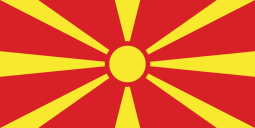







.svg.png)










.svg.png)











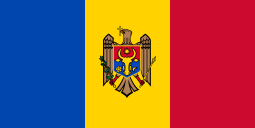
.svg.png)

Commentators
Most countries sent commentators to Düsseldorf or commentated from their own country, in order to add insight to the participants and, if necessary, the provision of voting information.
- Participating countries
The commentators of the 43 participating countries are as follows:
| Country | SF1 / SF2 / Final | Commentator(s) |
|---|---|---|
| All | Leon Menkshi (TVSH) | |
| All | Artak Vardanyan | |
| All | Andi Knoll (ORF eins) | |
| All | Martin Blumenau (Hitradio Ö3) | |
| Final | Benny Hörtnagl (Hitradio Ö3) | |
| All | Leyla Aliyeva (İctimai Televiziya və Radio Yayımları Şirkəti) | |
| All | Denis Kurian (Belarus 1) | |
| All | Jean-Pierre Hautier (French, La Une) | |
| Jean-Louis Lahaye (French, La Une) | ||
| André Vermeulen (Dutch, één) (Dutch, Radio 2) | ||
| Sven Pichal (Dutch, één) (Dutch, Radio 2) | ||
| All | Dejan Kukrić (BHT1) | |
| All | Elena Rosberg (BNT) | |
| Georgi Kushvaliev (BNT) | ||
| All | Duško Čurlić (HRT1) | |
| All | Melina Karageorgiou (RIK 1) | |
| All | Ole Tøpholm (DR1) | |
| All | Marko Reikop (ETV) | |
| All | Tarja Närhi (Finnish, YLE TV2, YLE HD) | |
| Asko Murtomäki (Finnish, YLE TV2, YLE HD) | ||
| Sanna Kojo (Finnish, YLE Radio Suomi) | ||
| Jorma Hietamäki (Finnish, YLE Radio Suomi) | ||
| Eva Frantz (Swedish, YLE FST5) | ||
| Johan Lindroos (Swedish, YLE FST5) | ||
| SF2 | Audrey Chauveau (France Ô) | |
| Bruno Berberes (France Ô) | ||
| Final | Laurent Boyer (France 3) | |
| Catherine Lara (France 3) | ||
| Final | Fred Musa (France Bleu) | |
| Éric Mazet (France Bleu) | ||
| All | Sopho Altunishvili | |
| All | Peter Urban (Das Erste) | |
| Thomas Mohr, Steffi Neu and Tim Frühling (NDR 2) | ||
| SF1 | Steven Gätjen (ProSieben) | |
| All | Maria Kozakou (NET and ERT HD) | |
| All | Gábor Gundel Takács (m1) | |
| All | Hrafnhildur Halldorsdóttir (Sjónvarpið) | |
| All | Marty Whelan (RTÉ One) | |
| All | Shay Byrne and Zbyszek Zalinski (RTÉ Radio 1)[109] | |
| All | No commentator | |
| SF2 & Final[110][111] | Raffaella Carrà (Rai 2) | |
| Bob Sinclar (Rai 2) | ||
| All | Valters Frīdenbergs, Uģis Joksts (LTV) | |
| All | Darius Užkuraitis (LRT) | |
| All | Eli Tanaskovska (MRT) | |
| All | Eileen Montesin (TVM) | |
| All | Marcel Spătari (TRM) | |
| All | Jan Smit (TROS) | |
| Daniël Dekker (TROS) | ||
| All | Olav Viksmo-Slettan (NRK1) | |
| All | Artur Orzech (TVP1) | |
| All | Sílvia Alberto (RTP1) | |
| All | Liana Stanciu (TVR1) | |
| Bogdan Pavlică (TVR1) | ||
| All | Yana Churikova (Channel One) | |
| Yuriy Aksyuta (Channel One) | ||
| Final | Kirill Nabutov (Channel One) | |
| All | Lia Fiorio (SMRTV) | |
| Gigi Restivo (SMRTV) | ||
| SF1 | Marina Nikolić (RTS1) | |
| SF2 | Dragan Ilić (RTS1) | |
| Final | Duška Vučinić-Lučić (RTS1) | |
| All | Tanja Zeljković (Radio Belgrade) | |
| All | Roman Bomboš (Jednotka (SF1 & Final), Dvojka (SF2)) | |
| All | Andrej Hofer (RTVSLO) | |
| All | José María Íñigo (La 1), (La 2) | |
| All | Hélène Benno (SVT1) | |
| Edward af Sillén (SVT1) | ||
| German[123] | Sven Epiney (SF zwei) | |
| French[124][125] | Jean-Marc Richard, Henri Dès (SF1) & Nicolas Tanner (Final) (TSR 2) | |
| Italian | Jonathan Tedesco (RSI La 2, semi-finals and RSI La 1, final) | |
| All | Bülend Özveren (TRT 1) | |
| Erhan Konuk (TRT 1) | ||
| All | Timur Miroshnychenko (First National TV Channel) | |
| Tetiana Terekhova (First National TV Channel) | ||
| Olena Zelinchenko (Radio Ukraine) | ||
| Semi-finals | Scott Mills (BBC Three) | |
| Sara Cox (BBC Three) | ||
| Final | Graham Norton (BBC One) | |
| Ken Bruce (BBC Radio 2) |
- Non-participating countries
The commentators of the non-participating countries are:
| Country | SF1/SF2/Final | Commentator(s) |
|---|---|---|
| All | Julia Zemiro (SBS) | |
| Sam Pang (SBS) | ||
| Final | No commentators (CCTV-15) |
Broadcasting

.svg.png)


.svg.png)
.svg.png)






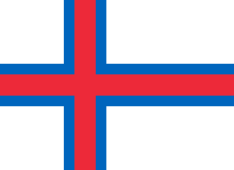





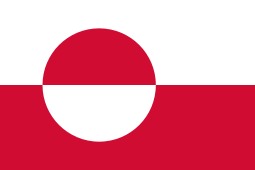
















.svg.png)








Official album
| Eurovision Song Contest: Düsseldorf 2011 | ||||
|---|---|---|---|---|
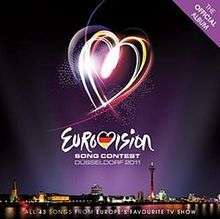 | ||||
| Compilation album by | ||||
| Released | 15 April 2011 | |||
| Genre | Pop | |||
| Length |
| |||
| Label | EMI / CMC | |||
| Eurovision Song Contest chronology | ||||
| ||||
Eurovision Song Contest: Düsseldorf 2011 was the official compilation album of the 2011 Contest, put together by the European Broadcasting Union and released by EMI Records and CMC International on 15 April 2011. The album featured all 43 songs that entered in the 2011 contest, including the semi-finalists that failed to qualify into the grand final.[157]
Charts
| Chart (2011) | Peak position |
|---|---|
| German Compilation Albums (Offizielle Top 100)[158] | 2 |
Notes and references
Notes
- Includes two lines in Albanian.
- Includes two phrases in French. American Sign Language was also used during the live televised performance.[54]
- Contains phrases in Bosnian.
- Includes two words in Russian.
References
- Bakker, Sietse (30 June 2010). "Final of Eurovision 2011 set for 14 May, Lena returns!". EBU. Retrieved 30 June 2010.
- "Eurovision 2011 wins prestigious Rose d'Or | News | Eurovision Song Contest – Copenhagen 2014". Eurovision.tv. 11 May 2012. Retrieved 16 November 2013.
- "Eurovision History by Year (1957)". EBU. Retrieved 29 May 2010.
- "Eurovision History by Year (1983)". EBU. Retrieved 29 May 2010.
- "Eurovision Song Contest kommt nach Düsseldorf" (in German). 7 October 2010. Retrieved 11 October 2010.
- "Eurovision Song Contest 2011 findet in Düsseldorf statt". Agence France-Presse. 12 October 2010. Retrieved 13 April 2011.
- "Eurovision Song Contest kommt nach Düsseldorf" (in German). 7 October 2010. Retrieved 7 October 2010.
- Mohr, Thomas. "Wir wollen die beste Show machen" [We want to make the best show] (in German). eurovision.ndr.de. Archived from the original on 14 November 2010. Retrieved 16 November 2013.
- "Jetzt will auch Schalke den Grand Prix" (in German). Bild.de. 1 June 2010. Retrieved 1 June 2010.
- "GERMANY – Seven cities already declared interest". Oikotimes. 31 May 2010. Archived from the original on 2 June 2010. Retrieved 31 May 2010.
- Bakker, Sietse (21 August 2010). "Four cities in the running to host Eurovision 2011". EBU. Retrieved 20 August 2010.
- "Luftnummer für den Grand Prix: Song Contest: Berlin bewirbt sich mit aufblasbarer Halle – Stadtleben – Berlin – Tagesspiegel". Der Tagesspiegel (in German). Retrieved 17 May 2011.
- Hoff, Rüdiger (23 September 2010). "Wenn Lena in Düsseldorf singt, weicht Fortuna" (in German). Retrieved 24 September 2010.
- "DFL genehmigt Umzug in den Flinger Broich" Archived 9 October 2010 at the Wayback Machine, Fortuna Düsseldorf, 6 October 2010 (in German)
- "NUSSLI builds interim stadium for Fortuna Düsseldorf" (PDF). Archived from the original (PDF) on 14 July 2011.
- Renner, Kai-Hinrich (2 October 2010). "Hamburg kann den Eurovision Song Contest abhaken". Hamburger Abendblatt (in German). Retrieved 2 October 2010.
- "Der ESC 2011 in Düsseldorf , Das Erste: Eurovision Song Contest – Event – Finale". Eurovision.ndr.de. Archived from the original on 21 December 2010. Retrieved 17 May 2011.
- "And the winner is... Düsseldorf! , News , Eurovision Song Contest – Düsseldorf 2011". Eurovision.tv. 12 October 2010. Retrieved 17 May 2011.
- "Eurovision Song Contest – Lenas großer Triumph". Stern (in German). 23 August 2010. Retrieved 10 September 2010.
- "Eurovision Song Contest 2011 findet in Düsseldorf statt". Agence France-Presse. 12 October 2010. Retrieved 13 April 2011.
- Bakker, Sietse (28 August 2010). "Reference Group gathered in Belgrade". EBU. Retrieved 28 August 2010.
- Bakker, Sietse (31 December 2010). "43 nations on 2011 participants list!". Eurovision.tv. Retrieved 31 December 2010.
- Bakker, Sietse (30 August 2010). "Svante Stockselius says Eurovision farewell". EBU. Retrieved 30 August 2010.
- Siim, Jarmo (26 November 2010). "Jon Ola Sand new Executive Supervisor". EBU. Retrieved 26 November 2010.
- Bakker, Sietse (16 January 2011). "Düsseldorf gets ready for exchange and draw". European Broadcasting Union. Retrieved 16 January 2011.
- "Düsseldorf 2011: Feel your heart beat!". Eurovision.tv. 13 January 2011. Retrieved 7 June 2012.
- "Exclusive details on Düsseldorf!". Eurovision.tv. 14 March 2011. Retrieved 7 June 2012.
- "Eurovision Song Contest Düsseldorf 2011". Turquoise Branding. 28 April 2011. Archived from the original on 8 March 2012. Retrieved 7 June 2012.
- "Eurovision 2012 – Light Your Fire". Turquoise Branding. 25 January 2012. Archived from the original on 30 May 2012. Retrieved 7 June 2012.
- "Presenters for 2011 Eurovision Song Contest announced! , News , Eurovision Song Contest – Düsseldorf 2011". Eurovision.tv. 16 December 2010. Retrieved 17 May 2011.
- "Wir wollen die beste Show machen" (in German). 13 October 2010. Archived from the original on 17 October 2010. Retrieved 13 October 2010.
- "Für sieben Grand-Prix-Shows wird es Tickets geben". Die Welt (in German). 25 October 2010. Retrieved 26 October 2010.
- "Nutzen sie Ihre Chance auf ein Ticket für den ESC 2011!". Archived from the original on 10 November 2010. Retrieved 19 November 2010.
- "Tickets Eurovision 2011 Final on sale this Sunday!". 'EBU'. 10 December 2010.
- Bakker, Sietse (12 December 2010). "Tickets Eurovision final sold out". Eurovision.tv. Retrieved 12 December 2010.
- Victor, Hondal (23 December 2010). "Montenegro officially out of Eurovision 2011". ESC Today. Archived from the original on 26 December 2010. Retrieved 23 December 2010.
- Floras, Stella (17 October 2010). "Slovakia: The public says Yes! to Eurovision". ESCToday. Retrieved 17 October 2010.
- Hondal, Victor (1 December 2010). "Slovakia withdraws from Eurovision 2011". ESCToday. Archived from the original on 4 December 2010. Retrieved 1 December 2010.
- Hondal, Victor (7 January 2011). "Slovakia: STV confirms withdrawal decision". ESCToday. Archived from the original on 10 January 2011. Retrieved 7 January 2011.
- Busa, Alexandru (17 January 2011). "Slovakia: Better in than paying fine". ESCToday. Archived from the original on 19 January 2011. Retrieved 17 January 2011.
- Bakker, Sietse (28 August 2010). "Reference Group gathered in Belgrade". EBU. Retrieved 28 August 2010.
- Al Kaziri, Ghassan (1 December 2010). "Dino Merlin returns as 2011 representative". Oikotimes. Archived from the original on 28 December 2011. Retrieved 6 December 2010.
- Escudero, Victor M. "Sigurjón's Friends will pay him homage in Düsseldorf". European Broadcasting Union. Retrieved 12 February 2011.
- "Aftur heim – info". Digiloo Thrush. Retrieved 19 February 2011.
- Brey, Marco (26 February 2011). "Zdob și Zdub to represent Moldova!". European Broadcasting Union. Archived from the original on 29 June 2011. Retrieved 26 February 2011.
- http://www.eurovision.tv/page/news?id=slovakia_choose_twiins_for_duesseldorf
- https://eurovision.tv/story/sophio-toroshelidze-new-lead-singer-of-eldrine
- Bakker, Sietse (26 May 2010). "EBU reveals split televoting and jury results". EBU. Retrieved 26 May 2010.
- "Voting | Eurovision Song Contest – Düsseldorf 2011". European Broadcasting Union. Archived from the original on 21 January 2011. Retrieved 18 March 2011.
- "Eurovision Song Contest 2011 Participants Eurovision Song Contest – Düsseldorf 2011". Archived from the original on 15 May 2011. Retrieved 30 March 2011.
- "Eurovision Song Contest 2011". The Diggiloo Thrush. Retrieved 5 March 2012.
- "Eurovision Song Contest 2011 semi-final (1)". European Broadcasting Union. 14 May 2011. Archived from the original on 1 June 2011. Retrieved 14 May 2011.
- Busa, Alexandru (14 May 2011). "Live: The Eurovision Final". ESCToday. Retrieved 4 November 2013.
- "Eurovision Song Contest 2011 semi-final (2)". European Broadcasting Union. 14 May 2011. Archived from the original on 19 October 2014. Retrieved 14 May 2011.
- "Eurovision Song Contest 2011 Final". European Broadcasting Union. 14 May 2011. Retrieved 14 May 2011.
- BBC Eurovision Paul. "UK televoting and jury votes revealed". BBC. Retrieved 27 May 2013.
- "Eurovision.TV". 20 May 2011. Archived from the original on 20 May 2011. Retrieved 31 March 2020.
- "Marcel Bezençon Award – an introduction". Poplight.se. Archived from the original on 17 October 2013. Retrieved 15 July 2012.
- Roxburgh, Gordon (27 May 2012). "Winners of the Marcel Bezençon Awards 2012". European Broadcasting Union. Retrieved 15 July 2012.
- "Eurovision Fanclub Network". OGAE. Retrieved 15 June 2012.
- "Club History" (in Finnish). OGAE Finland. 5 June 2012. Retrieved 17 June 2012.
- Vranis, Michalis (9 May 2011). "OGAE 2011 poll: We have a winner!". ESCToday.com. Retrieved 28 May 2013.
- "Barbara Dex Award 2011: Georgia's Eldrine Top Worst Dressed List at Eurovision 2011". wiwibloggs.org. Wiwibloggs. 20 May 2018. Retrieved 20 May 2018.
- NDR Press (11 May 2011). "EBU/NDR press conference". Eurovision.tv. Archived from the original on 14 April 2015. Retrieved 14 April 2015.
- "Mandy Huydts terug bij Songfestival". De Telegraaf (in Dutch). Retrieved 6 May 2011.
- Όνομα *. "ΕΛΕΟΣ! Γιούχαραν το 12άρι που έδωσε η Κύπρος στην Ελλάδα! " thousandnews". Thousandnews.wordpress.com. Retrieved 17 May 2011.
- Busa, Alexandru (13 May 2011). "Ruslana to announce the Ukrainian votes". ESCToday. Archived from the original on 15 May 2011. Retrieved 13 May 2011.
- "Susan Aho ilmoittaa Suomen pisteet Euroviisujen finaalissa" (in Finnish). yle.fi. Archived from the original on 17 March 2012. Retrieved 9 May 2011.
- Presenters: Alex Jones, Chris Evans (13 May 2011). "The One Show". The One Show. London. BBC. BBC One.
- "Lise uddeler Danmarks point". dr.dk. Retrieved 6 May 2011.
- "Big viewing figures". escdaily.com. Archived from the original on 16 May 2011. Retrieved 13 May 2011.
- Bokholm, Mirja (28 April 2011). "Eurovision Song Contest 2011: Danny Saucedo delar ut Sveriges poäng i Düsseldorf". Poplight (in Swedish). Archived from the original on 30 April 2011. Retrieved 28 April 2011.
- "Deutsche Jury steht offiziell fest" (in German). Archived from the original on 13 May 2011. Retrieved 11 May 2011.
- "Кто будет объявлять баллы на "Евровидении 2011" от Азербайджана?". Day.Az. 8 May 2011. Retrieved 9 May 2011.
- "Slakonja bo najprej zapel, nato pa Evropi sporočil, kdo je všeč Sloveniji..."
- "Cécile Bähler ist die Punkte-Fee der Schweiz – Eurovision Song Contest: Videos, Bilder und News – glanz & gloria – Schweizer Fernsehen" (in German). Glanzundgloria.sf.tv. Retrieved 17 May 2011.
- "Countdown for Final". eurovision.ert.gr. Archived from the original on 13 May 2011. Retrieved 12 May 2011.
- ESCkaz.com Georgia ESC 2011. Sofia Nizharadze as a spokesperson from Georgia
- "La France a son porte-parole" (in French). eurovision-info.net. Archived from the original on 20 July 2011. Retrieved 11 May 2011.
- "Veliko finale 56. takmičenja za Pesmu Evrovizije" (in Serbian). Archived from the original on 17 May 2011. Retrieved 14 May 2011.
- "Meet them: the hosts of Junior 2010! | Junior Eurovision Song Contest – Amsterdam 2012". Junioreurovision.tv. Retrieved 27 May 2013.
- Marc Calleja Bayliss (9 May 2011). "Breaking News: And the Spokesperson Is". Archived from the original on 19 March 2012. Retrieved 5 May 2019.
- "Comentadores Do ESC – escportugalforum.pt.vu | o forum eurovisivo português". 21595.activeboard.com. Archived from the original on 21 April 2012. Retrieved 9 August 2012.
- "Sumnja od Jugolasvenskog glasanja". Evropesma.org. Archived from the original on 8 April 2012. Retrieved 9 August 2012.
- "Elena S. Sánchez dará los votos de España en Düsseldorf" (in Spanish). eurovision-spain.com. 3 May 2011. Retrieved 3 May 2011.
- "אירוויזיון 2011: אזרבייג'ן זכתה בתחרות". Archived from the original on 20 July 2011. Retrieved 14 May 2011.
- "ETV: Saatekava" (in Estonian). etv.err.ee. Archived from the original on 9 July 2012. Retrieved 9 May 2011.
- "TONIGHT: The Grand Final". EBU. Retrieved 14 May 2011.
- "Maureen Louys, porte-parole pour la RTBF" (in French). eurovision-info.net. Archived from the original on 29 September 2011. Retrieved 6 May 2011.
- "Eirovīziju vairs nekomentēs Streips; Latvijas balsojumu paziņos Aisha" [Streip will no longer commentate on Eurovision; Latvia's vote will be announced by Aisha]. nra.lv (in Latvian). 29 April 2011. Retrieved 24 February 2020.
- "Radio Tirana Live". RTSH. Retrieved 10 May 2011.
- "Der Fahrplan zum Eurovision Song Contest 2011". cluboe3.orf.at. 23 April 2011. Archived from the original on 30 April 2011. Retrieved 25 April 2011.
- "Leyla Əliyeva: "Yoldaşımla İctimai Televiziyada tanış olmuşuq, o rejissor, mən aparıcıyam"". Modern.az. Archived from the original on 21 April 2012. Retrieved 22 May 2011.
- "Concours eurovision de la chanson" (in French). Archived from the original on 20 May 2011. Retrieved 11 May 2011.
- "Vermeulen en Pichal op Eurosong" (in Dutch). Archived from the original on 28 September 2011. Retrieved 12 May 2011.
- ""Douze points"". Archived from the original on 22 May 2011. Retrieved 14 July 2011.
- "56ος Διαγωνισμός Τραγουδιού της Eurovision: Όλα έτοιμα για το μεγάλο τελικό". Archived from the original on 17 June 2011. Retrieved 29 June 2011.
- "Ole Tøpholm skal kommentere Grand Prix". TVnyt.com. Retrieved 10 May 2011.
- "ETV: Saatekava". etv.err.ee. Archived from the original on 11 July 2012. Retrieved 9 May 2011.
- "Tarja Närhi tv-kommentaattoriksi Euroviisuihin" (in Finnish). satumaa.yle.fi. Archived from the original on 17 March 2012. Retrieved 10 May 2011.
- "Vi finns överallt" (in Swedish). svenska.yle.fi. Archived from the original on 24 July 2011. Retrieved 13 May 2011.
- "News – France: "We will respect every candidate"". ESCToday. Archived from the original on 10 May 2011. Retrieved 8 May 2011.
- "Der 'Eurovision Song Contest'-Countdown beginnt". Cinefacts.de. 9 May 2011. Archived from the original on 8 July 2013. Retrieved 10 May 2011.
- "Countdown for Final". ERT. Archived from the original on 13 May 2011. Retrieved 12 May 2011.
- "MTV Press Conference". eschungary.hu. 9 March 2011. Archived from the original on 15 March 2011. Retrieved 23 April 2011.
- "Hrafnhildur hringitónn". mbl.is. 13 May 2011. Retrieved 17 May 2011.
- "Eurovision just won't be the same without Larry, admits Marty". Herald.ie. 20 April 2012. Retrieved 2 May 2012.
- "RTE Facebook".
- "Raffaella Carrà e il duo Dose-Presta conduttori in Rai. E San Marino..."
- "Eurovision Song Contest 2011 in onda sabato 14 maggio 2011 alle 21.00" (in Italian). RAI press release. Archived from the original on 20 May 2011. Retrieved 2 May 2011.
- "Lietuva – "Eurovizijos" finale! , DELFI Pramogos". Pramogos.delfi.lt. Retrieved 17 May 2011.
- "Malta: Eileen Montesin Drafted in to Commentate". Escflashmalta.com. 27 April 2011. Archived from the original on 19 March 2012. Retrieved 17 May 2011.
- "Jan Smit commentator Eurovisie Songfestival 2011" (in Dutch). oranjemuziek.nl. 26 January 2011. Archived from the original on 2 February 2011. Retrieved 28 April 2011.
- Eivind M. Sætre. "Olav Viksmo Slettan fortsetter som kommentator". Escnorge.net. Archived from the original on 9 July 2012. Retrieved 9 August 2012.
- "Koncerty Eurowizji 2011 na żywo" (in Polish). koktajl24.pl. 10 May 2011. Archived from the original on 12 May 2011. Retrieved 10 May 2011.
- "SILVIA ALBERTO THE RTP COMMENTATOR IN DUSSELDORF". oikotimes.com. 7 April 2011. Retrieved 28 April 2011.
- "Евровидение-2012". Russia.tv. 25 May 2012. Retrieved 25 May 2012.
- "Pesma Evrovizije 2011". RTS. 8 May 2011. Retrieved 8 May 2011.
- "STV – Relácie – Jednotka – Eurovision Song Contest 2011". Stv.sk. Archived from the original on 27 September 2011. Retrieved 17 May 2011.
- "José María Íñigo retransmitirá la semi-final y final de Eurovisión 2011". RTVE (in Spanish). 7 February 2011. Retrieved 23 April 2011.
- "Edward af Sillén och Hélène Benno kommenterar ESC". SVT. 8 April 2011. Archived from the original on 22 April 2012. Retrieved 22 April 2011.
- "Sven Epiney:"So kann man nicht arbeiten!"". Blick. 11 May 2011. Archived from the original on 14 May 2011. Retrieved 14 May 2011.
- "CONCOURS EUROVISION DE LA CHANSON 2011". songcontest.free.fr. 10 May 2011. Retrieved 8 January 2014.
- "Qui va gagner l'Eurosong 2011 ?". RTS (in French). 13 May 2011. Retrieved 14 May 2011.
- "Turkish commentator hung up the phone after the Eurovision fail". YouTube. Retrieved 9 August 2012.
- ""Євробачення-2011" на Першому національному коментуватиме Тимур Мірошниченко". Telekrytyka. Archived from the original on 8 July 2013. Retrieved 15 May 2011.
- "BBC – Press Office – Sara Cox and Scott Mills front Eurovision semi-finals". BBC. Retrieved 21 April 2011.
- "SBS Eurovision – Whats-on-SBSONE". Special Broadcasting Service. Retrieved 4 May 2011.
- "Eurovision Armenia". eurovision.am. Retrieved 14 May 2011.
- "Программа передач Первого канала". Belteleradio First Channel. 14 May 2011. Retrieved 14 May 2011.
- "Concours eurovision de la chanson" (in French). rtbf.be. Archived from the original on 20 May 2011. Retrieved 11 May 2011.
- "BHT1 broadcasting for Bosnia and Herzegovina" (in Bosnian). bhrt.ba. 15 May 2011. Archived from the original on 23 July 2011.
- "Eurovision Song Contest 2011 – runde for runde" (in Danish). DR. Archived from the original on 9 May 2011. Retrieved 13 May 2011.
- "Eurovisiooni otseülekanded" (in Estonian). ERR. Archived from the original on 10 May 2011. Retrieved 9 May 2011.
- "Sjónvarp". Kringvarp.fo. Archived from the original on 15 April 2011. Retrieved 8 May 2011.
- "Ajankohtaista". YLE. Archived from the original on 28 April 2011. Retrieved 15 April 2011.
- "Eurovision Song Contest 2011 semi-final (1)". EBU. Archived from the original on 14 May 2011. Retrieved 13 April 2011.
- "Termine" (in German). NDR. Archived from the original on 27 April 2011. Retrieved 13 April 2011.
- "KNR TV". KNR. Retrieved 8 May 2011.
- "Press Release". mtvzrt.hu. Retrieved 23 April 2011.
- "MKRTV Program". Archived from the original on 27 July 2011.
- "Eurovisie Songfestival 1e voorronde". Nederland 1 (in Dutch). Retrieved 11 May 2011.
- "Eurovisie Songfestival Finale 2011". Nederland 1 (in Dutch). Retrieved 11 May 2011.
- "SONGFESTIVAL.NL :: Nieuws – detail" (in Dutch). Songfestival.nl. Retrieved 11 May 2011.
- "Triangle Stratos programmes". Triangle Stratos. Archived from the original on 16 July 2011. Retrieved 9 May 2011.
- "Melodi Grand Prix – Melodi Grand Prix – NRK". NRK. Archived from the original on 14 May 2011. Retrieved 11 May 2011.
- "Hotel FM a plecat la Eurovision" (in Romanian). TVR. 4 May 2011. Archived from the original on 14 May 2011. Retrieved 4 May 2011.
- "Прямая трансляция первого полуфинала конкурса "Евровидение-2011"". 1TV. 10 May 2011. Retrieved 10 May 2011.
- "TV Slovenija 2 – Tedenski TV spored". mojtv. Archived from the original on 22 August 2011. Retrieved 5 May 2011.
- "TVE emitirá las dos semi-finales de Eurovisión 2011". RTVE. Retrieved 26 April 2011.
- Dahlander, Gustav. "Edward af Sillén och Hélène Benno kommenterar ESC". SVT. Archived from the original on 9 October 2012. Retrieved 15 April 2011.
- "Trt Televizyon". Trt.net.tr. Retrieved 17 May 2011.
- "Телепрограма". NTU. Retrieved 8 May 2011.
- "Національна радіокомпанія транслюватиме "Євробачення" у прямому ефірі". Telekrytyka. Retrieved 15 May 2011.
- "BBC – Eurovision Song Contest 2011". BBC. Retrieved 13 April 2011.
- Siim, Jarmo (4 March 2011). "Pre-order your Eurovision CD right now!". eurovision.tv. European Broadcasting Union. Retrieved 6 November 2014.
- "Eurovision Song Contest 2011". Offiziellecharts.de. GfK Entertainment Charts. Retrieved 17 March 2018.
External links
| Wikinews has related articles: |

- Eurovision official website
